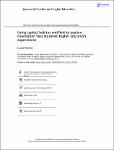Using capital, habitus and field to explore Foundation Year students’ Higher Education experiences
| dc.contributor.author | Webber, L | |
| dc.date.accessioned | 2023-12-12T12:02:38Z | |
| dc.date.available | 2023-12-12T12:02:38Z | |
| dc.date.issued | 2023-11-05 | |
| dc.identifier.issn | 1469-9486 | |
| dc.identifier.issn | 1469-9486 | |
| dc.identifier.uri | https://pearl.plymouth.ac.uk/handle/10026.1/21786 | |
| dc.description.abstract |
This article explores Foundation Year students’ experiences of Higher Education learning. The research took place during the COVID-19 pan-demic and provided a unique opportunity to formulate factors which contribute to the success of a Foundation Year programme. During the pandemic, the demand to study from home, created uncertainty as to whether students, classically with low confidence, reliant on university support, would cope away from a high level of face-to-face guidance during national lockdown. This article draws on qualitative data from interviews with six students from one University in England. Bourdieu’s concepts of habitus, field and capital demonstrate students can develop capital through a Foundation Year programme. This capital can be utilised during extreme learning situations like COVID-19. The findings show that the students felt prepared for independent, online learning due to the capital they had developed during the Foundation Year of their course. Initial analysis, from this small-scale project, identifies five factors which suggest an environment which is conducive to achieving study success for Foundation Year students. These factors contribute to a shift of habitus from when they first started at university. | |
| dc.format.extent | 1-15 | |
| dc.language | en | |
| dc.publisher | Taylor and Francis Group | |
| dc.subject | Foundation Year | |
| dc.subject | capital | |
| dc.subject | habitus | |
| dc.subject | field | |
| dc.subject | widening participation | |
| dc.subject | COVID-19 | |
| dc.title | Using capital, habitus and field to explore Foundation Year students’ Higher Education experiences | |
| dc.type | journal-article | |
| dc.type | Article | |
| plymouth.issue | 1 | |
| plymouth.volume | 48 | |
| plymouth.publisher-url | http://dx.doi.org/10.1080/0309877x.2023.2277418 | |
| plymouth.publication-status | Published | |
| plymouth.journal | Journal of Further and Higher Education | |
| dc.identifier.doi | 10.1080/0309877x.2023.2277418 | |
| plymouth.organisational-group | |Plymouth | |
| plymouth.organisational-group | |Plymouth|Faculty of Arts, Humanities and Business | |
| plymouth.organisational-group | |Plymouth|REF 2021 Researchers by UoA | |
| plymouth.organisational-group | |Plymouth|Users by role | |
| plymouth.organisational-group | |Plymouth|Users by role|Academics | |
| plymouth.organisational-group | |Plymouth|REF 2021 Researchers by UoA|UoA23 Education | |
| plymouth.organisational-group | |Plymouth|REF 2028 Researchers by UoA | |
| plymouth.organisational-group | |Plymouth|REF 2028 Researchers by UoA|UoA23 Education | |
| dcterms.dateAccepted | 2023-10-23 | |
| dc.date.updated | 2023-12-12T12:02:37Z | |
| dc.rights.embargodate | 2023-12-15 | |
| dc.identifier.eissn | 1469-9486 | |
| rioxxterms.versionofrecord | 10.1080/0309877x.2023.2277418 |


